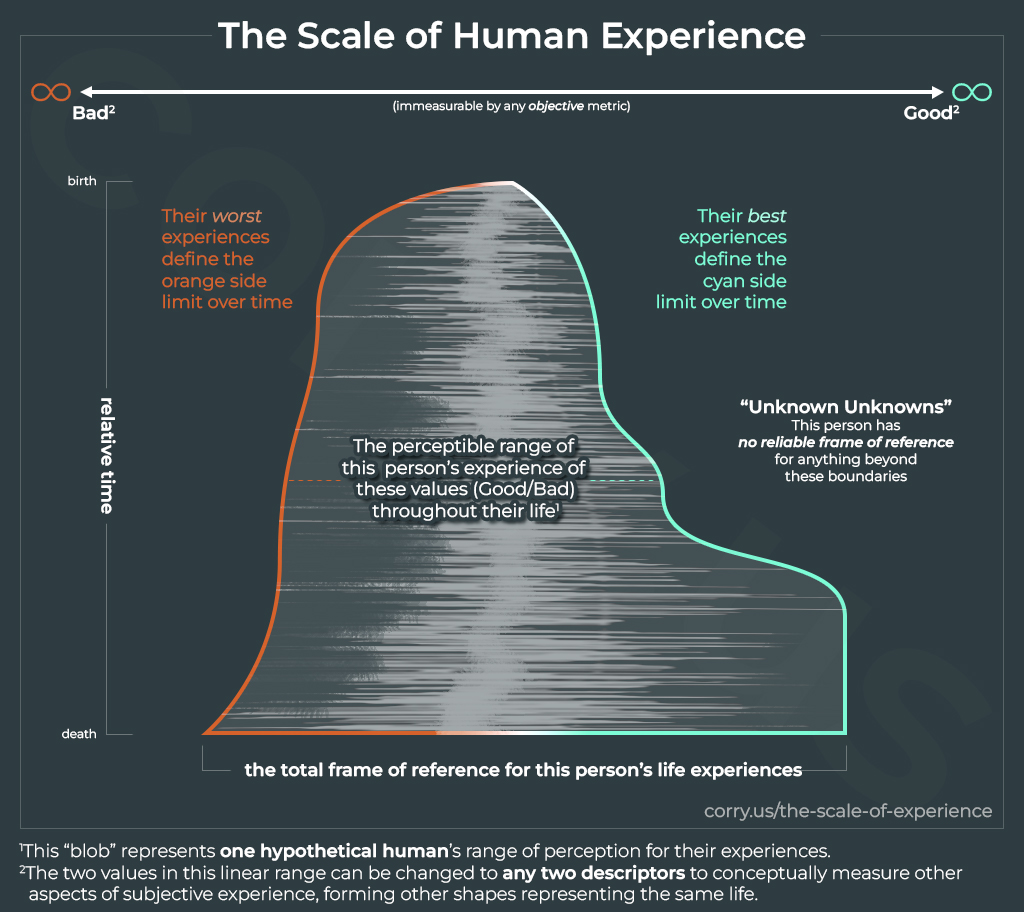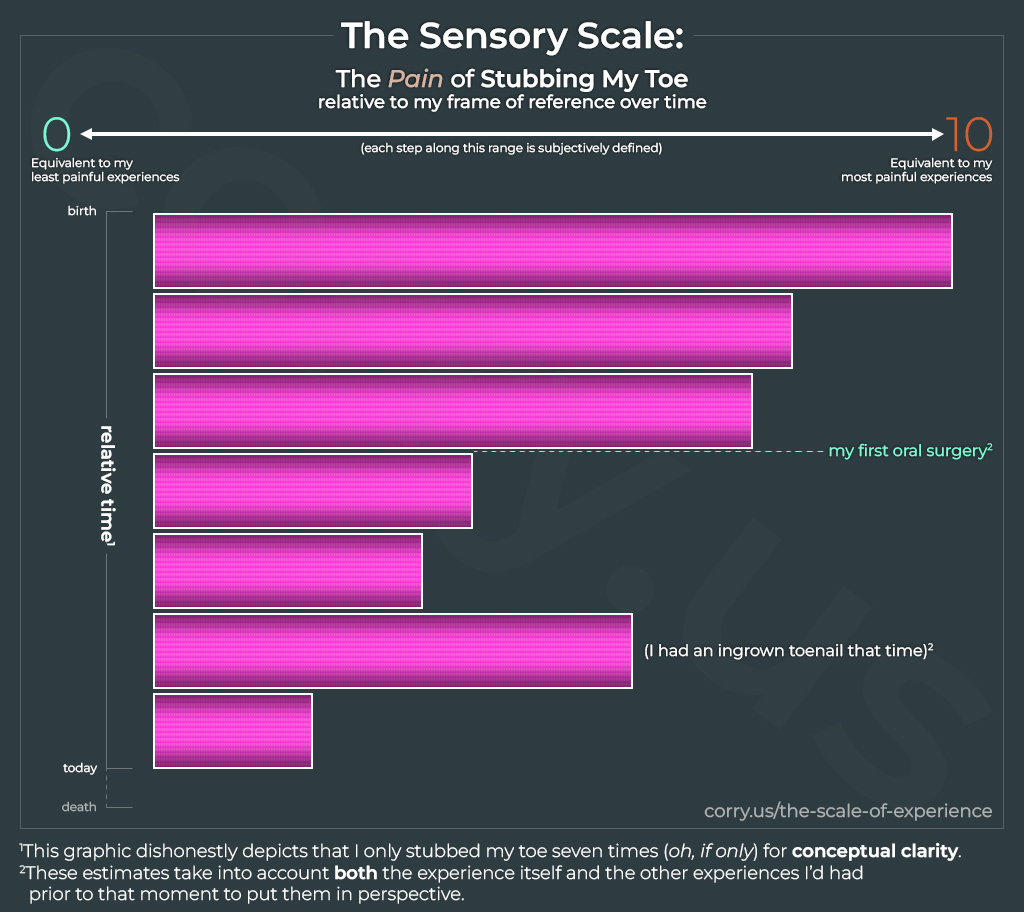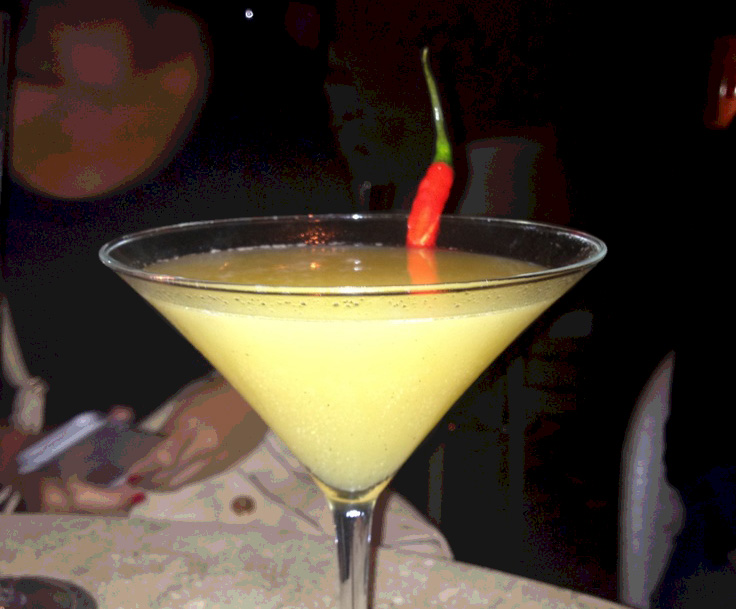
The Scale of Experience
Understanding ourselves and others is limited by our frame of reference, which is mostly involuntary and changes throughout our lifetime. I want to expand on a concept I wrote about 15 years ago in Why Do Bad Things Happen to Good People?.
The Scalability of Human Experience
Each person develops from birth along a path laid before them by the universe. No one has control over their path in life at any time in their conscious life. Everyone’s choices are guided by the experiences they’ve brought with them.
At the time of conception, the human body is a blank slate, but this state only exists for an immeasurably short time. The development of this person is entirely shaped by factors beyond itself. If the mother drinks, smokes, or eats certain things while pregnant, the fetus will be affected. The person is not even conscious yet, and they’re already being molded in ways they can’t control.
me, 2010
I still hold onto this theory. And while re-reading my description here I felt compelled to illustrate it. I’m a visual learner, after all. (Maybe you are too?)
The Scale of Human Experience Concept Graphic
I created this graphic to illustrate a complex concept, but it’s obviously incomplete. No 2D visualization could ever fully flesh it out. A 3D simulation tool the likes of OpenSpace — NASA’s universe simulator — could hypothetically work, but I’m not developing one of those. 🙂↔️
This “example life” visualization assumes a lossless memory, which few people have. Otherwise, the bounds would occasionally drift inward over time. Though it’s been established: even if we’re not consciously aware of what’s happened to us, the body remembers.
The “scribble” area within the blob is intended to infer individual experiences registering on this scale. The longest of these represent experiences that push those boundaries outward. In this particular simplified good/bad metric, one could consider the longer lines heading toward the orange border as trauma.
No one starts in the same place.
If we were to attempt to compare two people’s life experiences, it’d be tempting to plot two of these blobs on top of each other. There’s a few reasons this can’t work.
In a literal sense, just the location we’re born in determines much of the opportunities we’ll ever have. Then consider the unfathomable number of DNA variations, differences in family resources, available healthcare options, blind luck, and the moment of any two people’s births on this graphic would never overlap.
Add the layer of timing, and recognize how different our choices would’ve been if we were born just ten years earlier. And this changes quickly too. Imagine being a junior or senior in high school during the COVID-19 pandemic versus being a freshman or sophomore. Everyone’s lives were affected by it, but there are particular pivotal moments in our lives where these long-term affects are amplified.
Even people with near-identical DNA who’re born in the same place only moments apart have diverging perspectives. They may be closer than any other pair of living things, but never exactly the same. To believe these differences aren’t significant is to erase these siblings’ individual experiences.
Tolerance
Our sensational tolerance also differs person-to-person, even among people in similar health conditions. Even within our own lives, our tolerances change over time.
People with physiological (ex: Ehlers-Danlos, allergies) and neurological (ex: autism, SPD) conditions have especially noticeable differences in how we experience bodily sensations. These experiences are essentially “unknown unknowns” to most people.
Empathy is an attempt to simulate understanding, with no way to verify if our findings are accurate. This doesn’t mean attempting to empathize with others is a waste of time (don’t get too excited, narcissists). It just means we need to recognize that empathy is limited in how much we can actually understand. Feeling heard and seeing us make an effort to understand is still valuable.
My parents beat me when I was a kid and I turned out fine. Kids these days are too soft.
Student loan forgiveness is a terrible idea. I paid mine off, why can’t they?
What you’re doing isn’t hard. I could do it if I had to.
phrases about tolerance and ability uttered without a fundamental understanding of the contexts of the life experiences being compared
Resentment can also fester when we look at others who haven’t yet experienced things we have.
You have no idea how lucky you are to not have to deal with what I endured.
This resentment often guides social views about innocence and how we treat children, if we let it. (I try not to)
Different Strokes
People don’t even classify their experiences of the same stimuli the same way. Many would likely consider drinking one of my favorite ghost pepper lychee martinis as a painful and unpleasant experience.
Even if someone could start their perspective from a similar place as someone else, there’s no guarantee having similar experiences would affect them the same way. We could seek out similarities — I may enjoy some painful sensations, but I won’t pretend they’re not painful — but we struggle to place these experiences on the same place in a relative scale. This is why pain scales are still done with various up-to-interpretation scales in doctor’s offices.
No One Chooses to Exist
I’ve always felt this way, but I remember holding some of my darkest unprocessed feelings private when I wrote ‘Why Do Bad Things Happen to Good People?‘.
I often wonder if the moment we blink into consciousness is more intense for some than others. No matter who we are, suddenly transitioning into consciousness from whatever state we’re in before birth must undoubtedly be jarring.
Perhaps an understatement for the ages, but I wonder how different it feels to each person. It’s difficult to compare moments we can’t narrate as they happen to us nor remember. Forgetting much of our early lives is likely at least partially a protective trauma response. The brief moments of early childhood I remember are a cacophony of sensations I didn’t have tools to understand or rationalize until years — sometimes decades — later.
This also depends on whether it’s possible to perceive anything before birth or after death.
Teaser: I’m working on an article about this right now.
I don’t believe in free will.
Or rather, I believe the degree our will is free is limited by an approaching-infinite number of choices made without our input. My choice to have an avocado or eggs for breakfast is about as good as I get. I exist in a capitalist society where I must spend most of my life laboring for the benefit of a few privileged people I’ll never meet while being a political pariah for not conforming to compulsory social norms.
But today I chose an avocado, and am thus free. 🥑
If we take for granted that time is linear (is it?) and we choose a monotheistic creation myth, even God didn’t have free will when creating the universe.
Updates to My Scale
CW: Some of the experiences I’ll touch on here are extreme (for me). They’ll be kept vague here, skip them if you want, but the links to other posts may be graphic.
I’m not going to repeat things I listed in the original post, but here are some new ones.
My Most Physically Painful Experiences
This is not the hardest thing I’ve ever done.
Bethany taught me this more succinct wording of the pain management mantras I’ve used throughout my life. Meditating on ideas like this during difficult times has helped me endure. This coping tool doesn’t work when an experience is the hardest thing I’ve ever done, of course.
These are some sensations I need to really focus to endure:
- Laser Hair Removal on my face is probably tied (with periodontal injections) for #1 now .
- Luckily, it’s only a couple dozen short bursts for about 30 minutes, performed every 60 days for a finite number of sessions. (Visualizing the end of suffering and projecting myself there is another coping tool)
- Tattoos on my sternum are next up.
- Drinking too much of a carbonated beverage shortly after recovering from stomach surgery.
- Pretty much anything unexpectedly nudging a healing part of my body.
- I felt gas pains more acutely before my surgery, too.
- My spinal nerve damage and muscle scarring is horrible, not because it’s an extreme but because it’s relentless.
- Rehab sessions were probably the most painful part of the process.
- Extreme sleep deprivation makes everything hurt. It amplifies every negative sensation and mutes all the positive — like depression on steroids.
- I haven’t had this issue for many years now. 🤞
Luckily, I haven’t pushed these boundaries in too many new ways since 2010.
My Most Emotionally Painful Experiences
I’ve always been called sensitive. I stopped denying or misdirecting it long ago. I won’t apologize for feeling certain pains more sharply than others do, nor will I inflate my ego for having an easier time enduring pains others feel more intensely.
Related topic: Oppression Olympics
Here’s where I’ve broken new ground since 2010:
- Autistic meltdowns can emotionally burn me out for months or years after.
- School in general was a massively triggering environment. I was punished for “behavioral issues” throughout my attendance.
- Work burnout hit me multiple times in my career while dealing with bosses who believed in pushing me toward infinite productivity. (fuck Steve Jobs and his book)
- Driving or riding in a car can trigger PTSD and sensory overloads which can lead to this too.
- Dysphoria makes me disgusted by my appearance, the sensory experience of my own body, and feeling others touching me.
- Forcing myself to push through those feelings to please others makes it much worse.
- Sexual coercion experiences made it hard for me to trust myself or others.
- Being misgendered by people close to me (years after coming out to them) can occasionally hit me really hard — even when I know they’re supportive.
- Maybe I’ll get used to it. Maybe I don’t want to let myself. I haven’t decided yet.
- Rejection after significant emotional investment. Bidding for connection with someone who seems to welcome it, only to have them swat it away.
- Historical Example: I hosted a birthday party in the early years after my family moved to North Plainfield and no one showed up. I put a lot of effort (for a kid) into organizing it and making it fun for my guests.
- Modern Example: A family member abruptly changing the subject when a vulnerable and important topic comes up. (their boundaries are valid, but it does hurt)
- School-age bullying, especially after moving to a new town.
- I had at least a dozen suspensions for fighting, despite never starting those fights.
- I was desperate enough to bring a knife to school one day in 3rd grade, trying to scare my bullies away. (context: this was pre-Columbine)
- Being separated from friends when moving as a kid.
- I needed the practice to be decent at making friends now, but it came with great pain while moving around so many times.
- Even as an adult, I often didn’t feel like I was choosing to move with full autonomy. It was nearly always economic duress.
- The years when I believed
my mom was being exploited, abused, and/or coerced by my stepfather and endured it for our sake.- I no longer believe this was ever true, but thought so for many years and it really upset me. I didn’t truly understand my mom’s perspective, despite us being so close.
- Violating my core values to keep a job.
- I haven’t had to do this for my current job yet, which is incredibly unique.
- Grief. More people have died since my original post, more will continue to, and it never seems to get easier.
I’ve recovered some formative memories I was subconsciously suppressing through therapy, so some of these are a hindsight is 20/20 thing. I’m sure there are still more hiding in there somewhere.
My Scariest Experiences
- Moments during my suicide attempts when I thought I was going to be successful.
- And the days after surviving.
- Throwing away my masked self has made me feel existentially afraid for what others will do to me because I can’t pass as cis or allistic anymore.
- Being unsure if I’ll ever be able to get or keep a job again, even if I can remain free and unharmed.
- I lived with a guy who slowly revealed himself to be a roid-raging abuser (and possibly murderer) in a rented room in a house on the remote edge of Phoenix.
- I couldn’t afford to live anywhere else at the time, but I had to stealth move away in the night while he was out at the club. He stalked me for a couple years, but luckily never found me.
- Considering enlisting in the military when I was enduring a high-risk mental health moment.
- Watching my government disappear people off the streets during the Black Lives Matter protests.
- Knowing our country kidnaps and tortures people without any due process was what originally radicalized me against it, but all the footage and evidence of this happening to our own citizens doing legal nonviolent activism I do regularly made it feel like a real existential threat to myself.
- Watching my government disappear people off the streets, their homes, and their schools in 2025.
- And seeing many of my neighbors and loved ones letting it happen without resistance.
- The precarity of: “Will they stand up for me if I need them?”
My Greatest Pleasures
- Dozens of fun new sensory experiences I’ve encountered in the kink community help me continuously redefine what can be enjoyable and the degrees possible.
- Traveling and sensory adventures with food have helped me taste some incredible flavors, and I hope I never stop discovering more.
- Finding new art I really resonate with fills me with such delight.
- Spending quality time with my closest chosen family, especially truly freeform leisure time with no specific scheduled events.
- Visiting family at the Jersey shore (outside of holidays and their obligations) has brought me to joyful tears many times.
- I didn’t experience this until I unmasked, then carefully reduced the number of people in my closest orbit to feel 100% safe and unhesitatingly accepted. (The spaces where we choose to congregate are also important)
- Nailing an expression of love for someone I care about.
- I get so much pleasure out of witnessing another person validating I made a positive impact on their life.
- Having people show up to activities I plan and enjoy themselves.
- Receiving expressions of love, given in their own language, and understanding their intent.
- Receiving some forms of expressions of love can sometimes feel uncomfortable for me. It’s no small feat to push through and be gracious.
- I feel the warm fuzzies, but have trouble knowing how to express it if I don’t know how they want me to react. Providing clear social cues is really helpful.
- Gender euphoria feels like flying. When I’m feeling fully fresh, rested, expressive, and beautiful in a safe space, it’s incredible.
Related: ADHD and Sensory Seeking
Reflecting on Numbness
I haven’t experienced anything on the very edges of my scale in years now. I expect these things will continue to get rarer over time. I try to add things to the happier edges all the time, but it takes a lot more now than it used to. By the same token, fewer bad things will truly devastate me.
me, 2010
This was a combination of depression and pessimism. In hindsight, I remember several impactful highs and lows from that era which I couldn’t fully feel at the time for mental health — and possibly hormonal — reasons. If I could give my past self some advice about this:
It’s easy to rationalize numbness as something that just happens as we get older or as our relationships mature, but it’s not — unless we accept it.
Don’t accept it.
Updates to My 2010 Advice
Why do terrible tragedies happen to good people?
Because there is no such thing as a good person, and everyone has terrible tragedies in their lives.
If you’re looking for answers to this question, the best I can give is to learn more about yourself and find your scale of experience. Come to terms with the idea that we know very little and can never know everything. Then, think of questions that will actually help you in your own life and ask those instead.
me, 2010
My answers today aren’t pragmatically different, but I think I’d communicate it differently.
- Labeling the entirety of a living being with broad terms does a disservice to the complexity of their identity and their actions’ impact. Dispensing fair moral judgments on an entire person is impossible and unethical to attempt.
- We can judge actions, but judging people is dehumanizing. (see abolition)
- We must decide who to spend our time with carefully, but this isn’t moral superiority; it’s a personal boundary.
- Most of reality exists between extremes. I know gender is what I usually mean when I describe myself as non-binary, but it’s also a philosophical stance. I believe truth almost always exists in the grey areas, in compromise, and in flexible definitions.
- Values are subjective and ephemeral. Oversimplified descriptors like good and bad diminish our understanding of ourselves and experiences. I used those words in my graphic above as a starting point, but we can put pretty much any pair of descriptors in their place to conceptualize some experience we’re trying to understand.
- They don’t even need to be opposites or related.
(ex: best pizza I ever had versus worst movie I’d ever seen) - We can split the graph in half to just measure one descriptor rather than comparing two.
- Values are made up words about what matters to us, and we can share them but we usually don’t. We just have a habit of seeking connection and rounding things up to get along — and that’s mostly good, as long as we don’t drift too far from ourselves in our attempts to connect.
- They don’t even need to be opposites or related.
Every experience comes with complexity if we give ourselves enough time and focus to see it.


